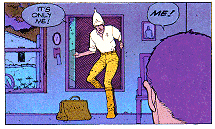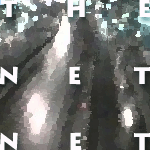
It's been said that a picture is worth a thousand words.
Perhaps a picture is, but most of the time, a comic strip panel
isn't. Yer average sooperhero panel is worth maybe five or ten
words, yer standard alternative black and white strip panel, no
more than fifty. It's only getting into the real draftsmanship
masters of comics -- Jim Woodring, Jamie Hernandez, Bill Elder -- that
the words-per-panel worth goes over the century mark. They're the
kind of artists where your eye twists down to the panel and stays
there until the last photon is absorbed. (I vividly remember
staring at a Hernandez panel for minutes on end, squinting my
eyes and shaking my head, saying, "How does he
do that?") And only the best panels are worth
more than a few hundred words, like those of Moebius.
Moebius (the pen name of Jean Giraud) is a prolific and popular
French comic artist working in the science fiction, fantasy, and
western genres. Anything that he turns his pen to comes out
looking interesting, and when he's in full flight, his strips are
as good as it gets in the business. His panel layouts are clean
and uncluttered, and he has an unequalled eye for the fantastic.
Therefore, mesdames and messieurs, we must all rejoice at the
latest bit of Moebiana to reach North American shores: the strips
collected in The Man from the Ciguri, published by Dark Horse
comics.
The Man from the Ciguri is a sequel to The Airtight Garage. It's
difficult to explain exactly what The Airtight Garage is; it's
somewhere in between postmodern space opera and absurdist
playwriting, but in comic book form. It roughly follows the
attempt by Major Grubert to thwart the plans of his many enemies
who are trying to take over the world--The Airtight Garage--that
Grubert himself created. Serialized in Metal Hurlant (the
original European Heavy Metal), Moebius deliberately structured
each two- to four-page episode as a false start; he would try to
tie the loose ends of the previous episode up and then start a
drastically new plot direction. While the results are uneven--
braiding together certain loose ends requires twists worthy of a
real Moebius strip--the comic has a giddy falling-of-a-cliff
quality, a level of stunning verbal and conceptual invention, and
fantastic art. The Airtight Garage was collected and published in
a mass-market trade paperback by Epic, a (sadly defunct) imprint
of Marvel comics. Epic also published several other collections
of Moebius' work.
At the end of The Airtight Garage, the enigmatic Major Grubert
walks through a portal to another world, a world very much like
our own, and The Man from the Ciguri takes up Grubert's story
with his attempt to get back to the Ciguri, his enemies' plans to
prevent him from returning, and his loyal crew's attempts to
rescue him.

The story of The Man from the Ciguri is as disjointed as The
Airtight Garage, with the proviso that the episodes seem to be a
little longer, and we already know quite a lot about the story
from The Airtight Garage; the universe is more set, and we
understand the principal characters and their personalities, from
the evil Bakalites to Grubert's consort, Malvina. Moebius'
artistic invention and sense of play is in full flight, though,
and several of the scenes venture deeper into emotional depths
than The Airtight Garage ever did. A particularly surreal murder
and a pleasant sex scene are two of the more memorable moments.
Fifteen years after starting The Airtight Garage, Moebius has
gained skill and daring at portraying characters and retained his
artistic talent.
Unfortunately, The Man from the Ciguri is too short, and doesn't
come to a climax. The Airtight Garage, while a serial, does have
an apocalyptic and cathartic ending, but The Man from the Ciguri
doesn't end in this volume. To round out the book, Dark Horse
stuck in three short Moebius pieces at the back, one humourous
piece featuring the original appearance of Major Grubert ("The
Hunt for the Vacationing Frenchman") and two dreamlike wordless
pieces ("Absoluten Calfeutrail" and "Double Escape"). However,
these three pieces were already collected in the Marvel/Epic
trade paperbacks, so many faithful readers will have seen them.
There's even some of the original black and white art for The Man
from the Ciguri in the back of the book; Moebius decided to
redraw those pages when the story was coloured. That's a nice
touch; it's fun to compare the two and see how Moebius'
conception of the end of the work changed, and how his seduction
scene improved. There's also the promise of new Moebius reaching
us here (the ads in the back trumpet more works to be published
by Dark Horse and Caliber), which will keep me haunting comics
stores for the next little while.
It's not all herbal bleane and blue coffee, though. There are
several problems with the package that Dark Horse put together.
Dark Horse is one of the stronger of the non-major comic
companies, and in an industry dominated by Marvel, DC, and Image,
it's great that a smaller publisher is reprinting quality
European work in North America. That said, this collection of The
Man from the Ciguri is not the right size for optimum Moebius
stripping. The Marvel/Epic trade paperback collection of The
Airtight Garage was about eight by eleven inches; Dark Horse's
The Man from the Ciguri is too small: around six by nine inches.
I'd pay the extra for the larger size; it's a pain to squint at
panels that were originally published in a full-size comic
magazine. Maybe it's for reasons of economy, but it's still a bad
decision.
As well, the introduction by Randy and Jean-Marc Lofficier is
odd. It's a difficult task to do the what-has-gone-before and
summarize the all-but-unsummarizable The Airtight Garage, but the
Lofficier introduction is far too linear and doesn't capture
the feel of The Airtight Garage at all. It also brings in
information that is either made up by the Lofficiers, or referred
to in works outside the scope of the Garage. (The Bakalite was
trying to uncreate the universe and steal the secrets of the
Nagual? I didn't know that.) Their slant on it makes it sound
like bad space adventure skiffy comics, when The Airtight Garage
is really much funnier, subversive and silly.
The colouring in The Man from the Ciguri can be very distracting,
as well. The colourists (not Moebius) tried an innovative approach
in colouring the word balloons, something that is rarely done in
comics. I don't think it works all that well, and it makes some
text very hard to read. Black ink on red or dark grey-blue
backgrounds fades right in. Still, there's some subtle and
powerful colour work in the murder scenes and elsewhere; I'd just
wish they hadn't sacrificed readability for the sake of matching
pigments.
It is Moebius, and therefore worth reading and re-reading. I'd
like a bigger, less extravagantly coloured book with more
original material, but I'll take what Dark Horse puts out. It's
about three times the price of a regular comic, but with much
more than three times the value. May you all travel safely
through the Randomearths, and watch out for the Bakalite.
Stoé Orkéo!





